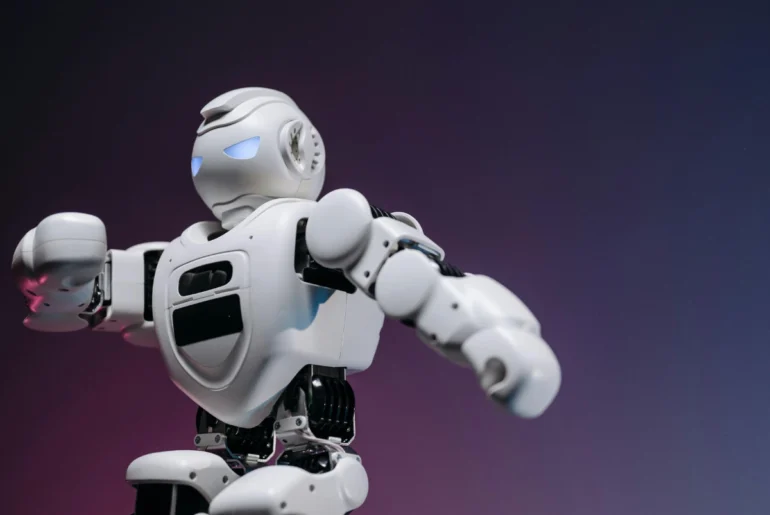The fast-changing digital ecosystem has made branding artificial intelligence a business-changing factor for businesses striving to be ahead of their game. With the constant growth of AI technology, unprecedented opportunities are provided that transform how brands reach out to their audiences.
Analyzing data, forecasting trends, and creating more personal experiences are the primary tools of AI that have led companies to develop better and more efficient branding policies with increased engagement, loyalty, and growth. With branding artificial intelligence, whether AI-driven customer insights, dynamic content creation, or automated marketing campaigns, the future of building stronger, more innovative brands is now open.
For further reading on AI progress, visit Gadget Gids.
8 Innovating Brand Strategies with AI
AI-Powered Brand Identity
AI-powered branding identity is changing businesses’ market identity. Today, brands can understand their preferred customer choices through artificial intelligence and, therefore, communicate through a more personalized or more compelling identity that echoes with the audience at their level.
AI analyzes massive data sets to develop logos, taglines, and brand voices that directly represent a business’s values, making it more memorable.
With AI, a brand can evolve. Therefore, brands can adjust their identity in real-time by updating it based on customers’ feedback and market trends. Thus, brands are kept up-to-date and remain strong at the relationship level. AI improves design and messaging, allowing a brand to connect better with its audience.
Crafting the Future with AI Branding
The art of the future is branding with AI, and cutting-edge technology is being used to push brands ahead of the curve with innovative data-driven strategies. With AI, one can gain valuable insight into consumer behavior, predict trends, personalize experiences, and create more emotional connections with audiences. This new level of precision and foresight redefines how brands connect with the world.
As AI advances, brands can efficiently refine messaging, design, and customer interactions. It automates some of the most mundane, time-consuming tasks to free up valuable resources, allowing brands to focus on creative growth and long-term vision. Powered by AI, the future is limitless for innovation and success in branding.
Transforming Brands through AI Insights
AI insights are changing how companies connect with their audience and transforming brands. The massive amount of data that AI processes shows hidden patterns and behaviors from consumers that drive the basis of decision-making for such brands. Brands will use these insights to better tailor their strategies, with each touchpoint highly personalized and impactful. This will make stronger engagement and customer loyalty inevitable.
Brands can use AI’s predictive ability to anticipate trends and respond in real-time. This agility keeps them one step ahead of the competition and enables quick adaptation to consumers’ changing needs.
It is not just about data; AI insights are about using data to tell a compelling and relevant story that resonates with customers and transforms brand identity and growth.
Building Trust with AI in Branding
Branding artificial intelligence is now changing how companies work to make their audience believe them. As AI becomes used, it will be able to present more relevant experiences that bring customers an understanding of and feel valued by the brand.
AI provides tools to fine-tune messaging, offers, and interactions to keep up with their preferences. Brands gain this reliability because customers feel better about working with a company that consistently fulfills their needs.
Branding artificial intelligence is essential in improving customer support, allowing for rapid, efficient responses through AI-powered chatbots and virtual assistants. These systems can answer questions in real-time, address problems quickly, and maintain a positive brand image.
In the future, as artificial intelligence continues to grow and develop, brands that see its potential to improve personalization and communication will foster more potent, more trustworthy relationships with their audiences, making them unique in a competitive marketplace.
Personalized Branding via AI
Branding artificial intelligence (AI) is a new concept that changes how companies develop tailored branding experiences. AI lets brands gain deeper insight into consumer preferences based on a volume of data, from how they browse to what they buy.
This enables them to create deeply tailored experiences that ensure messaging, products, and services resonate with each customer at a personal level. Thus, AI enables brands to create more relevant and engaging content and build a connection with their audience.
Even brands can adjust and adapt in real-time by using artificial intelligence to brand as customers behave and market trends shift instantaneously. AI-driven systems may further optimize customer journeys, suggesting personalized product recommendations or altering advertising strategies for an individual’s needs.
That level of personalization enriches the experience and boosts loyalty to a brand that sends a direct message to customers. AI is the harbinger of a future where efficient and effective branding is adequately personalized.
Data-Driven Branding with AI Tools
Branding artificial intelligence allows businesses to build data-driven strategies that transform how brands talk to their audiences. Through AI tools, brands can amass and analyze customer data to learn market preferences, behaviors, and trends.
Companies then use this knowledge to improve their messaging, content, and overall brand identity and make it better for what consumers need to be used in more targeted and effective marketing campaigns. Because it processes and interprets complex data, AI ensures that every branding decision has real-time information supporting it.
Additionally, branding with artificial intelligence allows brands to improve their strategies continually. AI tools monitor and report campaign performances, which can be an invaluable source of feedback on what works and what doesn’t.
Brands can respond quickly through a data-driven approach that strengthens customer engagement and fosters long-term brand loyalty. With AI at the branding center, companies can stay agile, relevant, and competitive in an ever-changing market.
AI’s Impact on Brand Perception
Branding artificial intelligence profoundly impacts brand perception because firms can now create more personalized, engaging experiences for their target audience. AI tools analyze customer interactions on social media, feedback on purchase history, and more to gain insights into consumer preferences. This allows branding to fine-tune messages and connect with audiences more deeply.
This approach gives brands a better and more trustworthy image as customers feel they understand and care for them. Branding AI thereby contributes to authentically shaping a brand’s identity in terms of resonance with the target audience.
Lastly, branding artificial intelligence further helps build the brand’s customer service and responsiveness profile, directly contributing to brand perception. AI-powered chatbots, virtual assistants, and automated support systems will quickly respond and provide accurate information to facilitate smooth and efficient interaction.
When AI delivers consistent and seamless customer experiences, it will instill trust and loyalty to shape how customers perceive the brand. Therefore, competition in a market would help brands gain a more favorable reputation than those using AI to increase customer satisfaction and engagement.
Revolutionizing Brand Loyalty with AI
Branding artificial intelligence transforms brand loyalty by offering tailor-made, data-driven experiences that are deeply connected with the customer. AI uses consumer behavior, preferences, and past interactions to enable highly customized loyalty programs that are updated in real-time to the needs of individual customers.
This means that relevant and impactful rewards, offers, and incentives are targeted at the right customer moment. Using AI to anticipate customer behavior and deliver rewarding experiences, brands can create more profound, meaningful emotional connections, leading to long-term loyalty.
Brand building through artificial intelligence increases customer loyalty as it makes them engage with the brand meaningfully through various touch points. AI-based tools like chatbots, recommendation engines, and predictive analytics let brands interact with customers at the right time and extent through timely communication.
This personalized interaction enhances the customer experience while increasing customer satisfaction and retention. The future of AI continues to bring even more excellent opportunities for brands to hone their loyalty strategies and form more profound, more rewarding relationships with their customers.
Conclusion
Branding artificial intelligence changes the face of modern marketing, allowing businesses to communicate better with their audiences through a more personalized and meaningful engagement. With AI, companies can analyze data and predict trends, optimize customer experiences, generate powerful identities, increase loyalty, and remain on top.
The progression of AI technology brings even more potential for transformative branding strategies in companies. Therefore, the proximity of a relationship with the consumer becomes closer to reality. Acceptance of branding artificial intelligence is no longer a trend but a requirement for brands that want to survive in the digital world.
FAQs
How can artificial intelligence enhance brand identity?
AI helps brands analyze consumer behavior, personalize experiences, create content, and optimize marketing strategies to ensure consistency and engagement.
What are the challenges of integrating AI into branding?
Challenges include maintaining brand authenticity, ensuring data privacy, avoiding biases in AI-driven decisions, and balancing automation with human creativity.
What AI tools are commonly used for branding?
Popular AI tools for branding include chatbots for customer engagement, AI-driven design platforms, predictive analytics tools, and content generation software to streamline marketing efforts.





